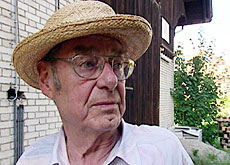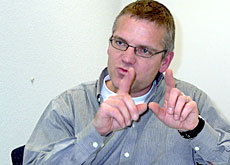Childhood scars leave indelible mark
Turi Honegger was 14 years old when he was taken away from his adopted family to work on a farm.
The regular beatings and the isolation left deep scars on the 80-year old retired writer and journalist, who struggled for decades to escape the nightmares of his childhood.
Honegger, who grew up as an orphan, was one of thousands of “Verdingkinder” (“discarded children”) who were handed over to farmers by Swiss local authorities during the 1930s and 40s.
“I had to do everything that the farmer ordered, from cleaning the cattle and stables to tending the fields,” Honegger told swissinfo. “I always worked alone and was never paid a scrap of money.”
His two gruelling years on the farm in Schlieren, canton Zurich, were all the more difficult because they followed what had been a period of relative calm in Turi’s childhood.
After an unsettled first few years of being shunted around various children’s homes, Honegger had settled with a family who treated him decently and allowed him to go to school, where he excelled.
But the promise of an education was cut short by a local official, who arrived unannounced one night in 1940 and informed the teenager that it was “time to earn a living”.
The next morning Honegger left his adopted home, never to return, and was handed over to the farmer in Schlieren.
Tyrant
“It was absolutely horrible. The farmer was a tyrant who watched my every move. If he saw anything he didn’t like, he beat me,” he said.
Honegger also vividly recalls the overwhelming loneliness of those years.
“I remember watching the family eat at the table, while I was huddled under the stairs. No one talked to me, so I talked to myself a lot.
“I had one friend who I turned to in my desperation, who’s father had some power locally. He promised to ask his father for help. But help never came.”
Worse was to come for the teenager, who was once again unexpectedly plucked away by local officials and put in a workhouse.
Honegger is reluctant to speak of these dark years, which he describes as the worst of his life.
“When I was released, I had no money and no clothes. The only option was to enrol for military service, where they complained that I was work shy.
“After that, I changed jobs frequently because nobody wanted me once they found out about my past.”
Stigma
The stigma of having been a child labourer blighted much of Honegger’s adult life.
“Even once I’d married and had settled down, I was kicked out by my local community, who said they didn’t want someone like me around.”
In his late twenties, Honegger enrolled in a night school and became become a journalist. He eventually got a job as reporter for the Swiss tabloid “Blick” and later wrote numerous books, including some about his childhood.
Despite the trauma he suffered, Honegger has preserved a remarkably lively and upbeat outlook on life.
“I’m a man who likes fun and I have a happy soul.
“I’ve come to terms with my past now. But it’s been very difficult… very difficult.”
swissinfo, Vanessa Mock

In compliance with the JTI standards
More: SWI swissinfo.ch certified by the Journalism Trust Initiative


You can find an overview of ongoing debates with our journalists here. Please join us!
If you want to start a conversation about a topic raised in this article or want to report factual errors, email us at english@swissinfo.ch.